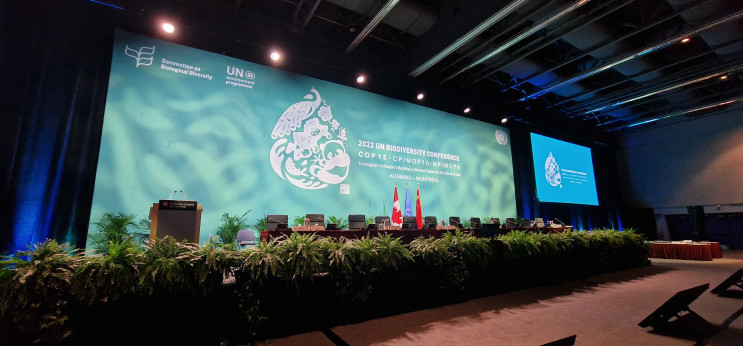Montreal, Canada, 19th December 2022
Today at the 15th meeting of the Conference of the Parties to the UN Convention on Biological Diversity (CBD COP15) in Montreal, the international community came together to endorse a new action plan for halting and reversing the loss of biodiversity and reducing the harms which biodiversity loss causes around the world.
The Kunming-Montreal Global Biodiversity Framework (KMGBF) will serve as the strategic plan of the CBD until 2030. It sets out an ambitious blueprint to achieve a global vision of living in harmony with nature by 2050. It includes four strategic goals for 2050, supported by 23 targets for the year 2030.
The purpose of the KMGBF is “to catalyse, enable and galvanise urgent and transformative action by Governments, and subnational and local authorities, with the involvement of all of society, to halt and reverse biodiversity loss”. The KMGBF recognises that the loss of biodiversity and degradation of ecosystems poses significant threats to health and well-being, and sets out actions to not only encourage conservation and restoration, but to improve human health and livelihoods by sustaining and enhancing nature’s contributions to people.
The KMGBF explicitly recognises the linkages between biodiversity and health and the objectives of the CBD. It states that it is to be implemented with consideration of the One Health approach and related approaches which aim “to sustainably balance and optimize the health of people, animals, plants and ecosystems, recognising the need for access to tools and technologies including medicines, vaccines and other health products related to biodiversity, while highlighting the urgent need to reduce pressures on biodiversity and decrease environmental degradation to reduce risks to health”
The KMGBF is an historic agreement, which includes a commitment to mobilise $200 billion (USD) per year by 2030 to support action for nature. However, if the agreement is to achieve its aims it will need to be implemented in full and the geopolitical and ideological divisions which marred some of the negotiations here in Montreal will need to be put aside.
The Cohab Initiative Secretariat is deeply concerned that the overwhelming evidence for the linkages between biodiversity and health – which have been reported jointly by the CBD and the World Health Organisation and have been peer-reviewed and acknowledged on multiple occasions by the COP – was questioned by certain Parties during the COP. Cohab believes that in some instances the efforts to undermine the science has been performative, a negotiating tactic, or driven by domestic political considerations in some countries. Regardless of the rationale, efforts to undermine the science which clearly demonstrates the importance of biodiversity to health are troubling, and damaging to the CBD process.
It is vexing that such attempts to undermine the CBD’s efforts to mainstream biodiversity into the health sector were raised in Montreal against the backdrop of the ongoing Covid 19 pandemic. Worldwide experiences of this global health emergency have shown repeatedly and clearly that biodiversity is key to our health and well-being, whilst evidence that ecosystem degradation is a driving factor for the emergence of infectious diseases in humans, livestock, crops and wildlife is abundant and already accepted by the COP.
It is also disappointing that the KMGBF does not contain any specific targets on health; however, the acknowledgement of health linkages and the commitment to the One Health approach is hugely important and serves as a vital link which can be built upon at future COPs, and at other multi-lateral for a including the World health Assembly.
Despite its concerns regarding some aspects of the negotiating process, Cohab greatly welcomes the adoption of this new Global Biodiversity Framework, which provides a new path for Cohab’s work at all levels.
